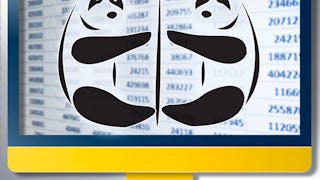Data wrangling is a crucial step in the data analysis process, as it involves the transformation and preparation of raw data into a suitable format for analysis. The "Fundamental Tools for Data Wrangling" course is designed to provide participants with essential skills and knowledge to effectively manipulate, clean, and analyze data. Participants will be introduced to the fundamental tools commonly used in data wrangling, including Python, data structures, NumPy, and pandas. Through hands-on exercises and practical examples, participants will gain the necessary proficiency to work with various data formats and effectively prepare data for analysis.



Fundamental Tools of Data Wrangling
This course is part of Data Wrangling with Python Specialization

Instructor: Di Wu
1,933 already enrolled
Included with 
(17 reviews)
Recommended experience
What you'll learn
You will be able to describe the fundamentals of programming in Python.
You will be able to identify data structures for efficient organization and manipulation of data.
You will practice using NumPy and Pandas for numerical computing, data manipulation, and analysis.
Skills you'll gain
Details to know

Add to your LinkedIn profile
10 assignments
See how employees at top companies are mastering in-demand skills

Build your subject-matter expertise
- Learn new concepts from industry experts
- Gain a foundational understanding of a subject or tool
- Develop job-relevant skills with hands-on projects
- Earn a shareable career certificate

There are 5 modules in this course
This week provides an introduction to the Python programming language, covering fundamental concepts and practical applications. You will gain a solid understanding of Python's syntax and semantics, enabling you to write efficient and concise code. We will also cover essential topics such as basic variables and operations, flow control structures, functions, and the utilization of external packages to enhance Python's capabilities.
What's included
4 videos7 readings3 assignments
The "Data Structures" week provides you with a comprehensive understanding of commonly used data structures for efficient organization and manipulation of data. You will explore various data structures, including strings, lists, sets, and dictionaries. Through theoretical explanations and practical examples, you will grasp the advantages of using each data structure and learn the fundamental operations associated with them.
What's included
4 videos7 readings4 assignments
The "NumPy" week serves as an introduction to the fundamental concepts and practical applications of NumPy, a powerful library for numerical computing in Python. You will gain insights into the advantages of utilizing NumPy for efficient data manipulation and mathematical operations. The week will cover the underlying data structure of NumPy arrays and guide students through basic array operations, including accessing and manipulation. Moreover, you will delve into advanced operations, such as masking and filtering, to perform complex data manipulations effectively.
What's included
3 videos4 readings1 assignment
The "Pandas" week provides you with a comprehensive introduction to Pandas, a powerful and widely used library for data manipulation and analysis in Python. You will explore the advantages of using Pandas for handling structured data efficiently. The week will cover the underlying data structure of Pandas, namely DataFrames and Series, and guide you through basic data operations, including accessing and manipulation. Moreover, you will delve into advanced data manipulations, such as masking, filtering, aggregating, pivot tables, and more, to effectively analyze and transform datasets.
What's included
3 videos4 readings1 assignment
The "Case Study" week offers you the opportunity to apply the knowledge you have gained throughout the course in a practical simulation case study. Through hands-on exercises and real-world scenarios, you will use Python and relevant packages to create a dummy dataset, mimicking a real dataset they might encounter in data analysis or scientific research. Throughout the case study, you will face challenges commonly encountered in real-world data analysis and will be encouraged to employ critical thinking and problem-solving skills to overcome them. This practical exercise will not only consolidate their understanding of Python and relevant packages but also foster a deeper appreciation for the importance of data preparation and analysis in various domains.
What's included
1 reading1 assignment
Earn a career certificate
Add this credential to your LinkedIn profile, resume, or CV. Share it on social media and in your performance review.
Instructor

Offered by
Explore more from Data Analysis
 Status: Free Trial
Status: Free Trial Status: Free Trial
Status: Free Trial
University of Colorado Boulder
 Status: Free Trial
Status: Free Trial
Johns Hopkins University
 Status: Free Trial
Status: Free Trial
University of Michigan
Why people choose Coursera for their career





Open new doors with Coursera Plus
Unlimited access to 10,000+ world-class courses, hands-on projects, and job-ready certificate programs - all included in your subscription
Advance your career with an online degree
Earn a degree from world-class universities - 100% online
Join over 3,400 global companies that choose Coursera for Business
Upskill your employees to excel in the digital economy
Frequently asked questions
Access to lectures and assignments depends on your type of enrollment. If you take a course in audit mode, you will be able to see most course materials for free. To access graded assignments and to earn a Certificate, you will need to purchase the Certificate experience, during or after your audit. If you don't see the audit option:
The course may not offer an audit option. You can try a Free Trial instead, or apply for Financial Aid.
The course may offer 'Full Course, No Certificate' instead. This option lets you see all course materials, submit required assessments, and get a final grade. This also means that you will not be able to purchase a Certificate experience.
When you enroll in the course, you get access to all of the courses in the Specialization, and you earn a certificate when you complete the work. Your electronic Certificate will be added to your Accomplishments page - from there, you can print your Certificate or add it to your LinkedIn profile. If you only want to read and view the course content, you can audit the course for free.
If you subscribed, you get a 7-day free trial during which you can cancel at no penalty. After that, we don’t give refunds, but you can cancel your subscription at any time. See our full refund policy.
More questions
Financial aid available,


